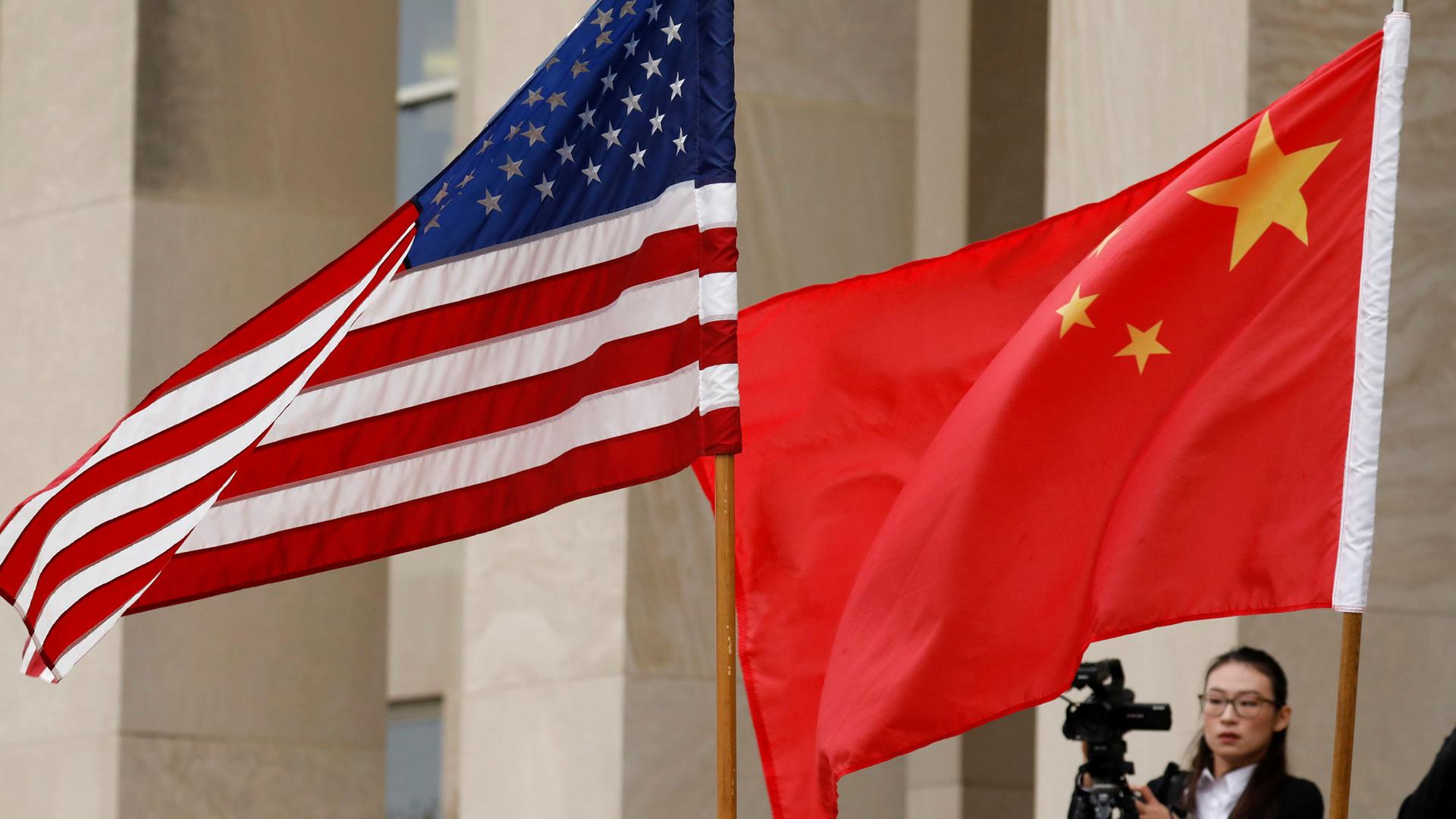China warnings signal Trump’s trade war finally hitting home
US and Chinese flags are seen at the Pentagon in Arlington, VA.
Weak sales at Apple and Cargill, US giants of technology and agriculture, may be the clearest sign yet that President Donald Trump’s quest to reset world trade carries costs at home and could isolate the United States as the increasingly fragile engine for global economic growth.
Apple, a global technology darling loved for its sleek gadgets, on Wednesday warned of disappointing quarterly revenues because of poor sales in China. On Thursday, privately held grains trader Cargill announced worse-than-expected results out of China.
China, the world’s second largest economy, likely expanded at more than 6 percent last year, reflecting a slowdown from years past and, in recent months, its most tepid rate since the depths of the global financial crisis a decade ago.
The US-China trade war threatens a decade-old hope among business and economic leaders that rising purchasing power among Chinese consumers would support an era of synchronized global growth.
The sharp slowdown in China and weakness elsewhere also threaten to leave US consumers, whose spending accounts for more than two-thirds of US economic activity and who so far have been eager to spend in an era of rising household incomes and wages, as the chief bulwark against a broader world downturn.
“There is an inconsistency between the US acting as a locomotive for the world and the objective of the Trump administration’s policy to reduce the trade deficit. That’s another reason why it will be challenging for the US consumer to act as world locomotive,” said Catherine Mann, global chief economist at Citi and the OECD’s former chief economist.
“We are looking at this balance between the strong domestic activity and the weaker external activity,” in the United States, Germany and elsewhere, she said, and also the “effectiveness of Chinese policy to turn the trajectory of the economy there.”
Other drivers of US growth, including government and business spending and net exports, are all sagging or expected to do so in coming months.
The US economy, the world’s biggest, is expected to slow from a very robust 2018 but should remain strong until about mid-2020 when economists polled by Reuters expect it to settle at 1.8 percent. In October the International Monetary Fund cut its 2019 global growth forecast to 3.7 percent, citing the trade war, and in December Citi trimmed its prediction to 3.1 percent.
What was hailed just a year ago as an era when the world’s major economies would all grow together has evolved in a more volatile direction, with the United States juiced along by tax cuts and government spending while the rest of the world sputters.
Businesses, amid uncertainty, have held back on the sort of investment that could boost long-term growth, while governments globally struggle with a combination of high debt levels and mounting infrastructure needs.
Market alarms
The US Federal Reserve’s interest rate increases have caused investors to move in and out of various markets, hitting some emerging markets hard. It has also helped spark severe volatility in the US stock market and a months-long selloff that analysts said signaled worries over a pending recession.
Apple shares tumbled 9.96 percent on Thursday to their lowest level since mid-2017 after the company slashed its sales forecast.
Apple’s announcement triggered memories of a technology-led market decline in 2000 that preceded a mild recession. “It’s oh so reminiscent,” said David Rosenberg, an economist at Gluskin Sheff+Associates, saying it was further evidence of a deteriorating outlook for Chinese manufacturing that will weigh on the global economy.
On Thursday, one Fed official said further planned rate hikes should be halted until that large assortment of global issues gets resolved.
“I would be an advocate of taking no action … in the first couple of quarters this year,” Dallas Fed President Robert Kaplan told Bloomberg television. In December, Fed policymakers forecast a median of two more hikes this year.
US Isolation
While Trump has put a March 1 deadline on striking a trade deal with Beijing, concerns extend beyond China to Europe, where a deal for Britain’s exit from the European Union, known as Brexit, has not been agreed with less than three months to go before the March 29 deadline.
But the impact of China is enormous. Chinese growth feeds into a variety of global prices such as oil, metals and microchips, driving investment and spending decisions worldwide. Evidence is piling up that tension between the world’s two largest economies has dampened business confidence and depressed investment.
It could mark a turn from most of 2018 when many economists and officials said the Trump administration’s higher trade tariffs had yet to seriously hurt US growth. Kevin Hassett, the White House economic adviser, said on Thursday the sharp drop in Chinese economic growth will hit US profits but sales for Apple and other firms should rebound once a trade deal is struck.
The US manufacturing sector has begun to slow, and the Institute of Supply Management’s survey of corporate purchasing managers on Monday showed the largest monthly decline since the depths of the recession in December 2008. A Dallas Fed quarterly survey of energy firms showed a marked slowdown at the end of 2018.
“The rest of the world is slowing, especially Europe and China, but the US has enough momentum,” said Mohamed El-Erian, the chief economic adviser of asset manager and insurer Allianz. “The problem is policymakers are not sensitive enough to spill-backs (and) market volatility could feed back into economic weakness.”
By Howard Schneider and Jonathan Spicer/Reuters
Reporting by Jonathan Spicer and Howard Schneider; Additional reporting by Jason Lange and Gaurika Juneja; Editing by Leslie Adler.
We want to hear your feedback so we can keep improving our website, theworld.org. Please fill out this quick survey and let us know your thoughts (your answers will be anonymous). Thanks for your time!
